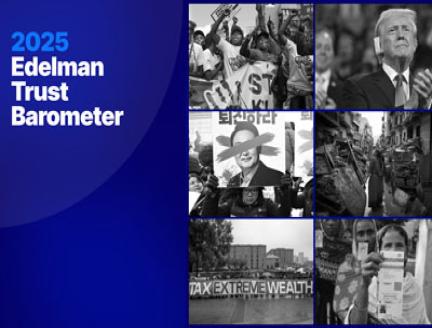In a world where trust in the media and government appears to be waning, it is understandable that people would turn to the leaders closest to them for vital information and support.
Edelman’s mid-year Trust Barometer update, A World in Trauma, has reiterated this trend towards confidence in the employer over other major institutions. While trust across the board appears to be dropping due to a widespread plague of misinformation, business remained the most trusted institution among those studied – and this was the perception globally.
However, this data has also shown how this growing relationship between employer and employee has become more complex and fraught with potential missteps.
“This research shows us that just as much as employees are placing their trust in their employers, the reverse must also be true, even more so in the South African context,” said Kgomotso Moalusi, Business Unit Director for Advisory at Edelman Africa.
In South Africa, the data showed that 72% of the people surveyed saw their employer as the most trusted institution – beating out government, media and non-governmental organisations. Meanwhile, 65% believed their CEOs were some of the most credible sources of information.
For Moalusi, this trend was intensified by the global COVID-19 pandemic, where people worldwide were seeking stability in a time where media and government were floundering in the face of constantly evolving medical information.
The companies most successful during this time, she said, were those where leadership maintained ongoing communications, focused on employee wellness (mentally and physically) and did what they could to address employee concerns about society at large.
“Analysis of our recent data has shown that employees are now one of the most important stakeholders for a business, and their voices are – rightfully – getting louder,” said Moalusi.
The survey showed that employees are seen as equally important as customers in determining a company’s long-term success, and that building trust with them had a variety of benefits. The research’s focus on the effects of the COVID-19 pandemic has also shone a spotlight on existing workplace issues.
When an employee thinks that their company is doing purpose-filled work and genuinely cares about social issues, this creates a ripple effect where that ingrained trust makes its way into the marketplace.
The opposite is also true, says Moalusi, leading to devastating effects when corporate entities are not seen as “good”, both in terms of employee treatment and overall commitment to improving society.
The trust survey showed that 86% of employees in South Africa expect their employer to act on major social issues such as racism and climate change. This of course, means that both employee wellbeing and societal wellbeing have to be a core focus to maintain trust.
The most important way of showing this care? Avoiding rhetoric.
“You have to do what you say as an institution. Walk the walk. If you don’t deliver on even the small commitments, no one is going to believe you when you have to make real change from within your institution,” said Moalusi.
Equally important – as the world comes to term with how the pandemic is changing the way we work – is recognising how this new paradigm can present new challenges. Tendencies towards micromanagement must be curbed.
“We have to trust in our employees to work. I have personally seen how by placing my trust in people and their abilities, we see the best results. It is up to managers to make space for dialogue, seek feedback and make sure we truly listen,” she said.
When the pandemic spread to South Africa early last year, the anxiety was palpable – and businesses had to evolve through an unprecedented event. But this was why two-way communication became so important. Understanding the very specific needs of employees, especially in South Africa where working-from-home can be prohibitively expensive for vast portions of the population, was essential.
“At Edelman Africa, what was encouraging was seeing the way we received information on pandemic guidelines and medical advice from the very top of the business – Richard Edelman – and how this was then cemented through regional and local leaders,” said Moalusi.




